Master of Science in Human Factors
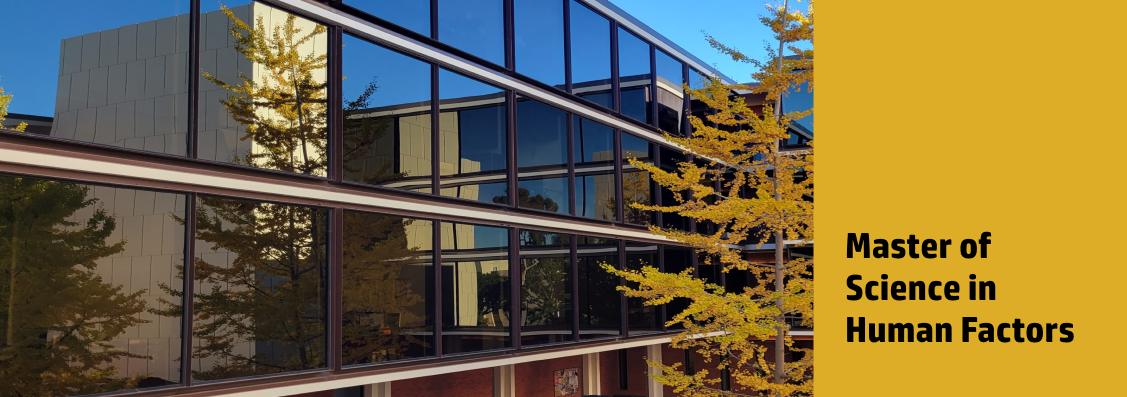
Human factors, also known as ergonomics or engineering psychology, is a scientific discipline which examines human behavior and capabilities in order to find the best ways to design products, equipment, and systems for safe, effective, and satisfying use by people.
The MS in Human Factors is designed to prepare students to apply research-focused human factors skills to the design of jobs, information systems, consumer products, workplaces, and equipment in order to improve user performance, safety, and comfort. Our Human Factors program is accredited by the Human Factors and Ergonomics Society
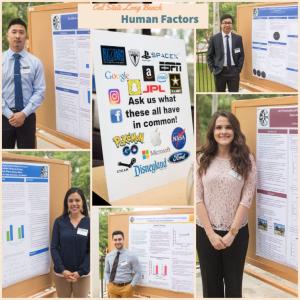
The MS in Human Factors (MSHF) at CSULB is designed to prepare students to apply human factors skills to the design of jobs, information systems, consumer products, workplaces and equipment in order to improve user performance, safety and comfort. This program is accredited by the Human Factors and Ergonomics Society, the accrediting board for human factors programs in the U.S.
Faculty in the CSULB MSHF in Psychology are currently working on a number of topics such as human-computer interaction, usability testing, auditory/visual display design, knowledge engineering and decision-making. Students in the program acquire a background in experimental psychology and research methods. They are trained in the application of human factors theories in courses such as computer applications and interface design. A practicum course gives students experience of how Human Factors is applied in a work-place setting. Special-topics seminars, in areas such as large-scale simulation and usability testing, complement the core program of study. Students also complete a thesis in their chosen area of human factors
Want to hear from our current students and alumni?
Important Dates for Fall 2026
- University and Department applications deadline: January 15, 2026
- Transcripts deadline: January 31, 2026
- Financial Aid CSULB Priority deadline: see CSULB's Financial Aid and Scholarships page
Admission Requirements
- You must have a bachelor’s degree in Psychology from a four-year accredited college or university, or a bachelor’s in another area and the equivalent of four lower division and eight upper division CSULB courses (please see Non-Psychology Bachelor’s Degree web page)
- Minimum undergraduate GPA of 2.5
- Prerequisite coursework must include the following CSULB courses (or equivalents, to be determined by Psychology Dept.):
PSY 310 Intermediate Statistics (requires Introductory Statistics)
PSY 331 Sensation and Perception
PSY 332 Cognition
Important Notice - GRE is NOT required for Fall 2026 application
CalStateApply may indicate that a GRE score sheet is required for the MSHF. However, the GRE is not required for the Fall 2026 application. If you are required to submit a GRE score sheet, please instead submit the GRE waiver form below:
CSULB_MSHF GRE waiver (Fall 2026)
Application
Download a:
The following documents must be submitted via the CalState Apply website:
*Attention Mac users: You must download Adobe Acrobat Reader to complete all fillable PDF forms for the application. Although Mac Preview appears to save the information correctly, the forms are blank when opened.
- University application ($70 fee)
- You must submit a university application via the CalState Apply website ($70 fee)
- Statement of Purpose
- Curriculum Vitae (CV)
- Document
- Please refer to the MSHF Prerequisite Course Description page to fill out this form.)
- Last 60/90 Units GPA Computation Form
- Psychology GPA Computation Form
- Three Letters of Recommendations (Instructions for submission are on the CalState Apply website)
- Unofficial transcripts from schools other than your Bachelor's degree-granting institution (see below) where you took Psychology courses. *Note: Applicants who took courses at CSULB must upload unofficial CSULB transcripts to their Cal State Apply application even if CSULB is the degree-granting institution.
---------------------------------------------------------------------
Submit official transcript from Bachelor's degree-granting institution:
Either by Mail:
Enrollment Services/Admissions
CSULB
1250 Bellflower Blvd.
Long Beach, CA 90840-0106
Or Electronically:
Official transcripts may be submitted electronically directly from a US college or university to ES-IDPTrans@csulb.edu
-------------------------------------------------------------------------
*International Students: Please be sure to contact the International Education office for university application procedures.
Tuition and Fees
Please refer to the university’s webpage on Tuition and Fees. Tuition and fees will depend on each student’s residency status and semester unit load. Typically MSHF students take three courses (9 units) per semester, for a total of four semesters.
Graduate Assistant (GA) Positions
GA positions are available on a competitive basis. Successful Psychology applicants who accept a program offer and are eligible to work in the US will be invited to submit a GA application.
Scholarships and Financial Aid
Links to information about Scholarships and Financial Aid are listed here.
Candidates in this program are responsible for observing the general requirements stated in the University Catalog as well as requirements specified by the Psychology Department. Please email MSHF.PSY@csulb.edu for more information.
Learning Outcomes of the MSHF Program
*Note that students are not required to receive external certification to obtain work in the field after graduation. However, if students are interested in certification, the Board of Certification in Professional Ergonomics provides professional certification for practitioners of human factors/ergonomics/user experience (HF/E/UX) who demonstrate expertise and comprehensive understanding of the discipline. Please see the CSU Notice to Students Regarding Professional Licensure and Certification for more information on professional licensure and certification.
The MSHF Program features a 36-unit full time, four-semester curriculum, with a Thesis or Applied Research Track as the capstone project. Students must maintain both a minimum cumulative and program GPA of 3.0 and successfully defend their capstone project.
Sample Schedule
1st Fall Semester
- PSY 518 – Computer Applications in Psychology
- PSY 527 – Human Factors
- PSY 511 – Statistical Design and Analysis of Experiments or Elective
1st Spring Semester
- PSY 627 – Human Factors’ Methods
- PSY 633 - Seminar in Perception and Attention or PSY 511 or Elective
- MAE 508 - Systems Engineering and Integration
2nd Fall Semester
- PSY 634 – Seminar in Cognition or PSY 511 or Elective
- PSY 689 – Practicum in Human Factors
- PSY 698 – Thesis (3 units)
2nd Spring Semester
- PSY 590 – Special Topics (replaces CECS 448)
- PSY 511 or Elective
- PSY 698 – Thesis (3 units)
Curriculum subject to change
MSHF Faculty Mentors

Gabriella Hancock
Associate Professor
PhD, University of Central Florida
My areas of interests and research are: Human performance under workload and stress, human-technology interaction, psychophysiological underpinnings of cognition, and cognitive neuroscience: individual differences.

Gerard L. Hanley
Professor Emeritus
PhD, State University of New York, Stony Brook
My areas of interests and research are: Human factors, cognition, human-computer interaction, knowledge engineering, professional and workforce development, usability evaluation, online education, open educational resources and services, and accessibility.
Some of my accomplishments are: 2020 Inductee into United States Distance Learning Association's Hall of Fame
Online Learning Consortium Fellow
Frank Mayadas Leadership Award in Online Education
MERLOT profile

David Illingworth
Assistant Professor
PhD, Georgia Institute of Technology
My research interests include decision-making, decision support systems, and information displays. Visit the DIS Lab website for more information.
Mandatory Photo Credit: Sean DuFrene
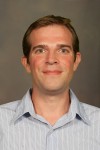
Jim Miles
Associate Professor
PhD, University of Virginia
My areas of interest and research are: Cognitive control processes, stimulus-response compatibility effects, goal intentions and environmental biases interaction. See my laboratory website for more details.
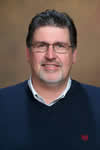
Thomas Strybel
Professor Emeritus
PhD, University of Arizona
My areas of interest and research are: Auditory-visual space perception, auditory-visual displays, multi-sensory interaction, human factors, and human-computer interaction. Some of my accomplishments are: University Achievement Award.

Kim Vu
Professor
PhD, Purdue University
Some of her accomplishments are: Taylor Award from Division 21 of American Psychological Association (APA) for outstanding achievements made by a psychologist in the field of applied experimental/engineering psychology. She is also a Fellow of APA (Division 3 and 21), Human Factors and Ergonomics Society (HFES), Psychonomic Society, and Association for Psychological Sciences (APS).
Research Facilities
The psychology department has 2 research laboratory Centers on site: CUDA (Center for Usability in Design and Accessibility) and CHAAT (Center for Human Factors in Advanced Aeronautics Technologies).
CUDA is a usability testing laboratory that provides real-world hands-on experience in usability testing and interface design. They have a wide range of clients:
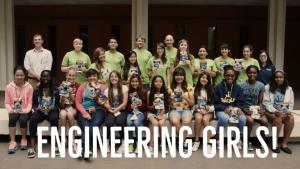
- Educational Institutions such as the CSU Office of the Chancellor and the universities and colleges in the CSU System
- Government agencies such as the National and Local Veterans administration and the U.S. Department of labor.
- Private companies such as Hewlett Foundation, Addison-Wesley, Southern California Edison, Honda and much more.
Check out the CUDA page for more details.
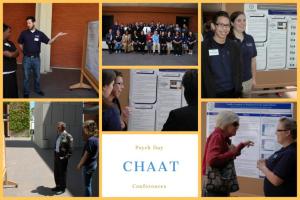
CHAAT is a state-of-the-art facility for research and simulations of advanced air technologies and air traffic management issues. CHAAT has partnerships with: The Federal Aviation Administration (FAA) and the National Aeronautics and Space Administration (NASA). To be more specific:
- The NASA Ames Research Center
- Airspace Operations Lab (AOL),
- Control TRACON Automation System (CTAS),
- Flight Deck Display Research Lab (FDDRL)
- The Langley Research Center.
Check out the CHAAT page for more details.
In addition to these two centers, there are a faculty run perceptual, cognitive, and neuroscience research laboratories with ample space and equipment for research in a variety of areas including auditory and visual perception, cognitive psychology, aviation psychology and human-computer.
- Miles Lab directed by Dr. Jim Miles focuses on the interaction between the environment and response behavior, mixed automation, radar displays and modeling situational awareness.
- Stress and Technology Applied Research (STAR) Lab, directed by Dr. Gabriella Hancock, investigates human performance under stress and workload, and how such behavior patterns can inform the design of more effective technological systems
Dr. Jim Miles
MSHF Graduate Advisor
MSHF.PSY@csulb.edu







